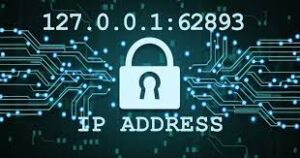
Introduction
In the world of networking and computer science, certain numbers and terms hold special significance due to their foundational roles in enabling communication between devices and software applications. One such term is 127.0.0.1:62893 often referred to as “localhost.” This specific IP address is universally recognized as the standard address for the loopback interface, which is used by a computer to send network traffic to itself. This self-referential address plays a crucial role in testing, development, and troubleshooting in networking environments. When paired with a port number, such as 62893, it can facilitate the operation of services and applications locally on a machine.
The Significance of Localhost
The term “localhost” is synonymous with the loopback address 127.0.0.1:62893 This address is reserved by the Internet Protocol (IP) for use in internal communication within the same host. When a program sends data to 127.0.0.1, it is effectively sending that data to itself. This loopback mechanism is an essential part of the network stack of any operating system, providing a reliable way for developers to test and debug applications in an isolated environment without impacting the broader network.
Testing and Development
Localhost is particularly important in software development and testing. By using 127.0.0.1:62893, developers can run servers, databases, and other networked applications locally, ensuring they work correctly before deploying them to production environments. This approach allows for safe testing of code changes, configurations, and new features, reducing the risk of introducing bugs or vulnerabilities to live systems. Localhost provides a sandboxed environment where applications can be developed and debugged efficiently.
What Are Port Numbers?
Port numbers are integral to the operation of networked applications. 127.0.0.1:62893 They function as communication endpoints, allowing multiple services to run simultaneously on a single IP address without interference. Each port number, ranging from 0 to 65535, is associated with a specific process or service on a computer. Standard services are typically assigned well-known port numbers (e.g., HTTP on port 80, HTTPS on port 443), while other applications can use higher, dynamically assigned port numbers.
Local Web Development
 One of the most common uses of 127.0.0.1:62893 is in local web development. Developers often set up local web servers on their machines to build and test websites or web applications. By configuring the server to listen on 127.0.0.1:62893, they can access the application through a web browser by navigating to 127.0.0.1:62893. This setup allows for rapid development cycles, immediate feedback, and debugging without requiring an internet connection or affecting live sites.
One of the most common uses of 127.0.0.1:62893 is in local web development. Developers often set up local web servers on their machines to build and test websites or web applications. By configuring the server to listen on 127.0.0.1:62893, they can access the application through a web browser by navigating to 127.0.0.1:62893. This setup allows for rapid development cycles, immediate feedback, and debugging without requiring an internet connection or affecting live sites.
Database Testing
Another practical application of 127.0.0.1:62893 is in database testing. Developers and database administrators can run database instances locally, connecting to them via the loopback address and a specified port number. This configuration is particularly useful for testing database queries, schema changes, and application integration. By using a unique port number like 62893, multiple database instances can run simultaneously, facilitating complex testing scenarios and development workflows.
API Development and Testing
APIs (Application Programming Interfaces) are essential components of modern software architecture. Developers often create and test APIs locally before deploying them to production environments. By configuring the API server to listen on 127.0.0.1:62893, they can interact with the API endpoints using tools like Postman or curl, ensuring the API functions correctly and meets performance expectations. Local testing with specific port numbers helps isolate the API from other network traffic and simplifies debugging.
Configuring Applications to Use 127.0.0.1:62893
To set up a local web server on 127.0.0.1:62893, developers typically use platforms like Apache, Nginx, or Node.js. The configuration involves specifying the loopback address and port number in the server settings. For example, in an Apache configuration file, the developer might add. This setup directs Apache to listen for HTTP requests on the specified loopback address and port, serving content from the specified directory.
Deploying and Testing APIs
When developing APIs, frameworks like Express.js (for Node.js) or Flask (for Python) can be configured to run on 127.0.0.1:62893. In an Express.js application, the setup might look like this: While using 127.0.0.1 for local services offers numerous benefits, it also provides inherent security advantages. Since the loopback address is not accessible from external networks, applications bound to 127.0.0.1 are isolated from potential external threats. This isolation ensures that local services remain secure, as they are not exposed to the internet or other devices on the network.
Localhost in Web Development
Web developers often use localhost to run local instances of content management systems (CMS) like WordPress or Drupal. By configuring these systems to use 127.0.0.1:62893, developers can create, edit, and test websites locally before making them live. This local development environment allows for rapid iteration and testing, ensuring that websites are fully functional and bug-free when deployed.
Database Management
Database administrators (DBAs) frequently use localhost for tasks such as database backups, migrations, and performance tuning. By running database servers locally on 127.0.0.1:62893, DBAs can perform these tasks without impacting production systems. This setup provides a safe environment for experimenting with database configurations, optimizing queries, and testing new features.
Unique Port Allocation
To avoid port conflicts and ensure smooth operation, developers should allocate unique port numbers for each application or service running on localhost. Maintaining a registry of used ports and assigning new ones as needed helps prevent overlaps and simplifies troubleshooting. This practice is especially important in environments where multiple developers or applications share the same local machine.
Regular Testing
Regularly testing applications on localhost helps identify issues early in the development process. By using automated testing tools and continuous integration/continuous deployment (CI/CD) pipelines, developers can ensure that applications remain stable and functional throughout development. Testing locally with 127.0.0.1:62893 provides a reliable and consistent environment for running these tests.
Security Considerations
While localhost is inherently secure from external threats, developers should still follow best practices for securing applications. This includes using secure coding practices, regularly updating software and dependencies, and implementing proper authentication and authorization mechanisms. Ensuring that applications running on localhost are secure helps prevent potential vulnerabilities from being introduced when the applications are deployed to production.
API Development
In API development, using 127.0.0.1:62893 allows developers to build and test APIs locally, ensuring they meet performance and functionality requirements. For example, a developer might use this setup to test an API that interacts with a front-end application, simulating various user interactions and validating responses. By isolating the API on the loopback address and a unique port, developers can focus on refining the API without external interference.
Conclusion
127.0.0.1:62893 and port numbers like is a fundamental aspect of modern computing. It enables developers to create, test, and debug applications in a controlled, isolated environment, ensuring that software functions correctly before deployment. By understanding and leveraging the loopback address and port numbers, developers can enhance their productivity, improve software quality, and maintain secure local environments. Whether it’s for web development, database management, or API testing, 127.0.0.1:62893 is an indispensable tool in the toolkit of developers and IT professionals.
You May Also Read: RS 149 Bear Design Long-Sleeve Baby Jumpsuit TheSpark Shop


